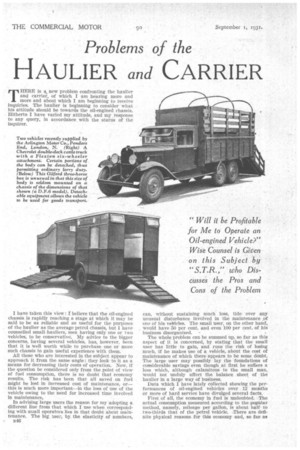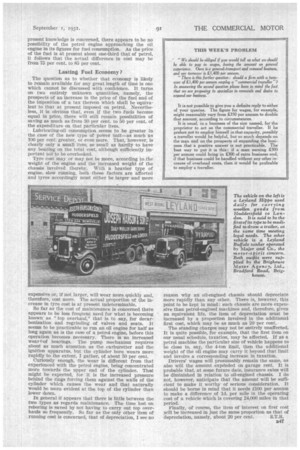Problems of the
Page 64

Page 65

If you've noticed an error in this article please click here to report it so we can fix it.
HAULIER and CARRIER " Will i/be Profitable for Me to Operate an Oil-engined Vehicle?" Wise Counsel is Given on this Subject by "S.T.R.," who Discusses the Pros and Cons of the Problem THERE is a_ new problem confronting the, haulier and carrier, of which I am hearing more and more and about which I am beginning to receive inquiries. The haulier is beginning to consider what his attitude should be towards the oil-engined chassis. Hitherto I have varied my attitude, and my response to any query, in accordance with the status of the inquirer.
I have taken this view: l believe that the oil-engined chassis, is rapidly reaching a stage at whieh it may be said to be as reliable and as useful for the purposes of the haulier as the average petrol chassis, but I have counselled small hauliers, men having only one or two vehicles; to be conservative. My advice to the bigger concerns, having several vehicles, has, however, been that it is Well worth while to purchase one or more such chassis to gain useful experience with them.
All those who are interested in the subject appear to approach it from the same ,angle: they look to it as a means for decreasing their costs of operation. Now, if the question be considered only from the point of view. of fuel consumption, there is no doubt that economy results. The risk has been that all saved on fuel might be lost, in increased cost of maintenance, or— this is much more important—in the loss of use of the vehicle owing to the need for increased time involved In maintenance.
In advising large users the reason for my adopting a different line from that which I use when corresponding with small operators lies in that doubt about maintenance. . The big user, by, the elasticity of numbers, n46 can, without sustaining much loss, tide over any unusual disturbance involved in the maintenance pf one of his vehicles. The small user, on the other hand, would have 50 per cent. and even 100 per cent. of his business disorganiv,ed.
The whole problem can be summed up, so far as this aspect of it is concerned, by stating that the small user has little to gain, and runs the risk of losing much, if he makes use of a vehicle, about the cost of maintenance of which there appears to be some doubt. The large user may possibly lay the foundations of considerable savings even though at first he suffers a loss which, although calamitous to the small man, would not unduly affect the balance sheet of the haulier in a large way of business.
Data which I have lately collected showing the performances of oil-engined vehicles over 12 months or more of hard service have divulged several-facts.
First of all, the economy in fuel is undoubted. The actual consumption measured according to the.popinar method, namely, mileage per gallon, is about halfto two-thirds that of the petrol vehicle. .There are definite physical reasons for this economy and, so far. as present knowledge is concerned, there appears to be no possibility of the petrol engine approaching the oil engine in its figures for fuel consumption. As the price of the fuel is at present about one-third that of petrol, it follows that the actual difference in cost may be from 75 per cent. to 85 per cent.
Lasting Fuel Economy ?
, The question as to whether that economy is likely to remain available for any great length of time is one which cannot be discussed with confidence. It turns on two entirely unknown quantities, namely, the prospects of an increase in the price of the fuel and of the imposition of a tax thereon which shall be equivalent to that at present imposed on petrol. Nevertheless, it is obvious that, even if the two fuels become equal in price, there will still remain possibilities of saving as much as from 30 per cent. to 50 per cent. of the expenditure on that particular item.
Lubricating-oil consumption seems to be greater in the ease of the new type of Power unit---amuch -as 100 per cent. greater, or even more. That, however, is clearly only a small item, so small as hardly to have any bearing on the total cost, although sufficiently important not to be overlooked.
Tyre cost may or may not be more, according to ,the weight of the engine and the increased weight of the chassis involved thereby. With a heavier type of engine, slow running, both these factors are affected and tyres accordingly must .either be larger and more
expensive or, if not larger, will wear more quickly and, therefore, cost more. The actual proportion of the increase in tyre cost is at present indeterminable.
So far as the cost of maintenance is concerned there appears to be less frequent need for what is becoming known' as "top overhaul," that is to say, for decarbonization and regrinding of valves and seats. It seems to be practicable to run an oil engine for half as long again as is the case of a petrol engine, before this operation becomes necessary. There is no increased wearof bearings. The pump mechanism requires about as much attention as the carburetter and the ignition apparatus, but the cylinder bore wears more rapidly to the extent, I gather, of about 50 per cent. Curiously enough, the wear is different from that experienced with the petrol engine, being concentrated more towards the upper end of the cylinder. That might be expected, for it is the increased pressure behind the rings forcing them against the walls of the cylinder which causes the wear and that naturally would be more evident at the top of the cylinder than lower down.
In general it appears that there is little between the two types as regards maintenance. The time lost on reboring is saved by not having to carry out top overhauls so frequently. So far as the only other item of running cost is concerned, that of depreciation, I see no
reason why an oil-engined chassis should depreciate more rapidly than any other. There is, however, this point to be kept in mind: such chassis are more expensive than petrol-engined machines and, therefore, given an equivalent life, the item of depreciation must be increased by a proportion involved in the additional first cost, which may be as much as 20 per cent.
The standing charges may not be entirely unaffected. It is quite possible, for example, that the first item on our usual schedule, taxation, may be affected. If as a petrol machine the particular size of vehicle happens to be close to, say, the 4-ton limit, then the additional weight of the oil engine may carry it beyond that limit and involve a corresponding increase in taxation.
Drivers' wages will presumably remain the same, as also will the amount expended on garage rent. It is probable that, at some future date, insurance rates will be diminished in relation to oil-engined chassis. I do not, however, anticipate that the amount will be sufficient to make it worthy of serious consideration. It should be borne in mind that it needs £100 per annum to make a difference of id. per mile in the operating cost of a vehicle which is covering 24,000 miles in that period.
Finally, of course, the item of interest on first cost will be increased in just the same proportion as that of depreciation, namely, about 20 per cent. • S.T.R.




































































































